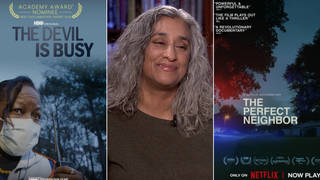
Guests
- Rebecca Grantauthor and freelance journalist covering reproductive rights, health and justice.
The Supreme Court has sided with South Carolina’s efforts to defund Planned Parenthood. Lower court rulings allowed Medicaid patients to sue over the state’s restrictions on Medicaid funding for their healthcare clinics, which the Supreme Court overturned in a 6-3 decision on Thursday. Rebecca Grant, who writes about reproductive rights, says South Carolina’s restrictions will likely be taken up by other states and could result in the closure of potentially hundreds of reproductive healthcare clinics. Grant outlines the alternative healthcare methods that many are forced to turn to in the face of dangerous and, since the fall of Roe v. Wade, increasingly draconian abortion restrictions. “We know throughout history that making abortion illegal or trying to ban it does not make it go away,” she says. This underground network of abortion access in the United States is the subject of Grant’s new book, Access: Inside the Abortion Underground and the Sixty-Year Battle for Reproductive Freedom.
Transcript
AMY GOODMAN: In a 6-to-3 ruling, the Supreme Court’s backed efforts by South Carolina to defund Planned Parenthood by removing its health clinics from the state’s Medicaid program. In a dissent joined by her liberal colleagues, Justice Ketanji Brown Jackson said the ruling, quote, “Will strip those South Carolinians — and countless other Medicaid recipients around the country — of a deeply personal freedom: the ability to decide who treats us at our most vulnerable,” unquote.
Vicki Ringer of Planned Parenthood South Carolina spoke outside the Supreme Court Thursday.
VICKI RINGER: Now, the governor has said, “Oh, there’s so many other Medicaid providers.” We know that’s a fallacy. There are not. We have a dire shortage of Medicaid providers. When the governor first issued this executive order in 2018, we scrambled to find other providers who would care for our patients. What we found was there was no one who would see a patient in less than three months. Well, if you’ve got a problem, three months is unacceptable. So, who are they going to go to? Meanwhile, the state is sending money to these anti-abortion clinics that provide no healthcare whatsoever. But the main reason that they’ve done this is clearly political. They want to shut down Planned Parenthood, and they want to have a backdoor ban for abortion.
AMY GOODMAN: The ruling comes three years after the court overturned Roe v. Wade, eliminating the federal constitutional right to abortion.
We’re joined now in Washington, D.C., by Rebecca Grant, author and freelance journalist covering reproductive rights, health and justice. Her new book, just out, is titled _Access: Inside the Abortion Underground and the Sixty-Year Battle for Reproductive Freedom_.
Before we talk about the resistance to what’s taken place, I’d like you to respond to the Supreme Court’s decision and its significance.
REBECCA GRANT: Yeah, I think it is yet another example in a very long line of anti-abortion politicians taking actions that we know will directly harm women and people who can get pregnant, and particularly people who are poor, who are low-income, who have very limited options for how else they can access the healthcare that they so badly need. I mean, South Carolina, as the representative from Planned Parenthood mentioned, I think it’s 41 out of 46 counties are considered federally designated healthcare provider shortage areas. So, it’s extremely unclear where people need to go. And this is in a state that already has very high rates of maternal mortality and of STIs. And so, it’s part of this broader effort to cut down on all reproductive healthcare and not just abortion access.
AMY GOODMAN: And talk about what this means for other states around the country. This is South Carolina.
REBECCA GRANT: The kind of term that I have been hearing is this idea that it will open the floodgates. There are already a handful of other states that have taken steps to, you know, essentially, kick Planned Parenthood off of Medicaid. This is also something that anti-abortion politicians have been trying to do in one form or another since at least 2015. And so, I think it’s extremely likely that we are going to see many states move to make similar moves or advance the moves that they’ve already made, and that could result in the closure of hundreds, potentially, of reproductive healthcare clinics. And this is on top of other moves that the administration is making to make this type of healthcare more difficult to access.
AMY GOODMAN: In 2023, the first lawsuit after the Supreme Court overturned Roe v. Wade was filed by five women who sued Texas after they were denied abortions, even as their pregnancies posed serious risks to their health and were nonviable. This week, three years later, about a hundred, as they call them, abortion storytellers came to Washington, D.C., to tell their stories. One of them was the plaintiff in that case, Amanda Zurawski.
AMANDA ZURAWSKI: I cannot adequately put into words the trauma and despair that comes with waiting to either lose your own life, your child’s life, or both. For days, I was locked in this bizarre and avoidable hell. … In a matter of minutes, I went from being physically healthy to developing sepsis, a condition in which bacteria in the blood develops into infection with the ability to kill in under an hour.
AMY GOODMAN: So, that was Amanda Zurawski, who was speaking then, a while ago, but today is in Washington, D.C., telling her story again. Rebecca Grant, this takes us to the resistance. Certainly, Amanda is one of the leaders in that resistance. But you write about this in this remarkable book, Access: Inside the Abortion Underground and the Sixty-Year Battle for Reproductive Freedom. Can you talk about, on the one hand, the Supreme Court overturning Roe v. Wade, but the fact that abortions have increased since the overturning of Roe v. Wade, even in some of the most repressive states when it comes to abortion bans in the country? Explain what’s going on.
REBECCA GRANT: Yeah, I think that that statistic speaks to the incredible resilience and bravery and, I mean, frankly, creativity of the abortion access movement. And so, while Dobbs is absolutely — you know, there have been dire consequences, at the same time, I think that there is a way that the movement has stepped up to ensure that anyone who needs an abortion is able to get one. And so, some of the reasons for the increase — and by the way, that increase does not include numbers of self-managed abortion, which there is also research showing that those numbers have gone up, that more people are self-managing their abortion, like, outside of the medical or legal system.
But I think one of the primary drivers is the accessibility of telemedicine abortion. COVID precipitated some changes in the FDA regulations around mifepristone, which is one of the two drugs of the medication abortion regimen, and said that it could be mailed. And so, over the past couple years, there have been telehealth providers who are able to evaluate patients online and write prescriptions and send the medication to them to take in their homes. And there are what are known as shield law providers, who are clinicians in blue states that have passed these shield law protections who are still serving patients in all 50 states. And so, because of the advances in telemedicine, which now make up, I believe, one in five abortions in the U.S., abortion is more accessible in some ways, in many ways, than it was before the Dobbs decision.
I think another factor is the kind of abortion fund ecosystem and the way that they are supporting people traveling out of state. So, between 2020 and 2023, the numbers of abortion seekers who have left their state, who have traveled out of state to access care, has doubled. And abortion funds have dispensed tens of millions of dollars to enable them to go access care elsewhere. And so, I think that that has been something that’s been really powerful and inspiring to see, because we know throughout history that making abortion illegal or trying to ban it does not make it go away. People will find other ways to access the care that they need.
And one of the things that’s so powerful about medication abortion and telemedicine is that it means that people kind of have more options than ever to access abortion in a way that is convenient and doesn’t necessarily require them to travel out of state. But at the same time, while we know that medication abortion is very safe and effective, and for some people can be convenient, it’s not a good fit for everyone. There will always be people who need or want clinic-based care. And depending on the state that they’re in, the legal environment can be really kind of tenuous and risky. And so, people are just making the best decisions that they can, the best choices that they can, with the resources that are available to them.
AMY GOODMAN: We just have a minute to go, but one of the powers of your book, Rebecca, in Access, is the women who are really leaders of the movement. You talked about shield laws. Tell us about Dr. Linda Prine and the fact that it was Brazil women, women in Brazil, who realized that an off use of the ulcer drug, the medication abortion drugs, was abortion.
REBECCA GRANT: Yeah, I mean, when — so, the two drugs, both mifepristone and misoprostol — so, misoprostol can be used on its own to induce an abortion. And as you said, it was registered as an ulcer medication. And so, in the 1980s in Brazil, which had an abortion ban and really high rates of complications and maternal mortality, through word of mouth, women started realizing that they could take this drug, like, in the community. They could just buy it from local pharmacies, and they could safely and effectively end their pregnancies.
And I think that there’s this really — something I try to draw in the book is this connection, this legacy of just individuals and activists over the years who have tried to share this information as broadly and widely and make it as accessible as possible. And I think that Dr. Linda Prine and other shield law providers who have really been incredibly active in trying to carry on that legacy, really, and make medication abortion accessible to people in all 50 states and around the world.
AMY GOODMAN: We’re going to talk more about these cases and about Dr. Rebecca Gomperts, Women on Waves, the organization that has fought to get women the medication abortion drugs around the world, especially in places where there are bans on abortion. We’re going to talk with Rebecca Grant after the show and post it as a web exclusive online at democracynow.org. Rebecca Grant is author of the new book Access: Inside the Abortion Underground and the Sixty-Year Battle for Reproductive Freedom. Her book before that was called Birth.
Coming up, the case of Andry José Hernández Romero, a gay makeup artist and asylum seeker from Venezuela who has spent over 100 days locked up in El Salvador’s mega-prison CECOT, after being sent there by the Trump administration. We’ll speak with his mother and his best friend. Stay with us.
[break]
AMY GOODMAN: “Nunca Más” by La Santa Cecilia in our Democracy Now! studio.










Media Options